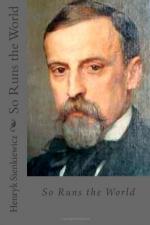Sienkiewicz searching always and continually for a tranquil harbor from the storms of conscience and investigation of the tormented mind, finds such a harbor in the religious sentiments, in lively Christian faith. This idea is woven as golden thread in a silk brocade, not only in “Quo Vadis,” but also in all his novels. In “Fire and Sword” his principal hero is an outlaw; but all his crimes, not only against society, but also against nature, are redeemed by faith, and as a consequence of it afterward by good deeds. In the “Children of the Soul,” he takes one of his principal characters upon one of seven Roman hills, and having displayed before him in the most eloquent way the might of the old Rome, the might as it never existed before and perhaps never will exist again, he says: “And from all that nothing is left only crosses! crosses! crosses!” It seems to us that in “Quo Vadis” Sienkiewicz strained all his forces to reproduce from one side all the power, all riches, all refinement, all corruption of the Roman civilization in order to get a better contrast with the great advantages of the cry of the living faith: Pro Christo! In that cry the asphyxiated not only in old times but in our days also find refreshment; the tormented by doubt, peace. From that cry flows hope, and naturally people prefer those from whom the blessing comes to those who curse and doom them.
Sienkiewicz considers the Christian faith as the principal and even the only help which humanity needs to bear cheerfully the burden and struggle of every-day life. Equally his personal experience as well as his studies made him worship Christ. He is not one of those who say that religion is good for the people at large. He does not admit such a shade of contempt in a question touching so near the human heart. He knows that every one is a man in the presence of sorrow and the conundrum of fate, contradiction of justice, tearing of death, and uneasiness of hope. He believes that the only way to cross the precipice is the flight with the wings of faith, the precipice made between the submission to general and absolute laws and the confidence in the infinite goodness of the Father.
The time passes and carries with it people and doctrines and systems. Many authors left as the heritage to civilization rows of books, and in those books scepticism, indifference, doubt, lack of precision and decision.
But the last symptoms in the literature show us that the Stoicism is not sufficient for our generation, not satisfied with Marcus Aurelius’s gospel, which was not sufficient even to that brilliant Sienkiewicz’s Roman arbiter elegantiarum, the over-refined patrician Petronius. A nation which desired to live, and does not wish either to perish in the desert or be drowned in the mud, needs such a great help which only religion gives. The history is not only magister vitae, but also it is the master of conscience.
Literature has in Sienkiewicz a great poet—epical as well as lyrical.




